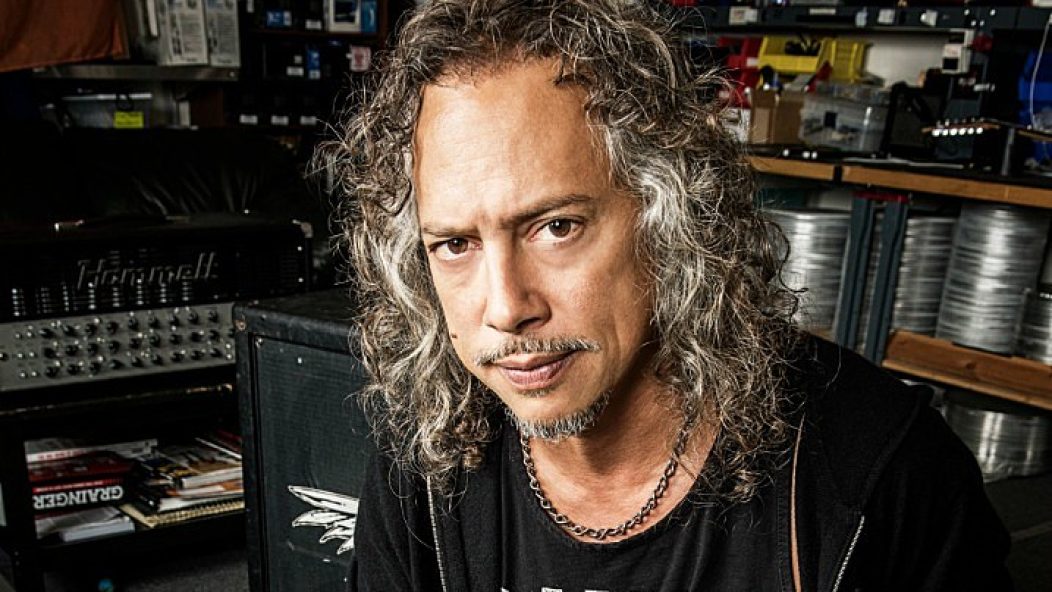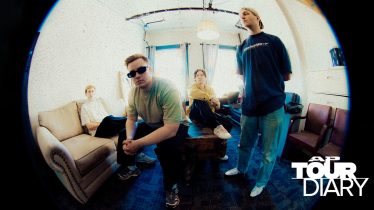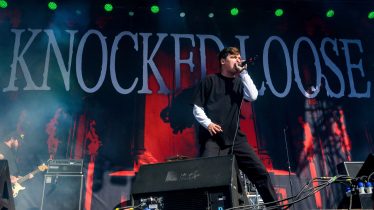
“This month I start writing my script” – Q&A with Kirk Hammett of Metallica
Last week, Metallica sold more records than the latest releases from Simple Plan, Halsey, Fall Out Boy, 5 Seconds Of Summer, Bring Me The Horizon and Slipknot. The legendary band’s self-titled set, commonly referred to as The Black Album, sold about 10 times as many copies in February as All Time Low’s Future Hearts. The record that blessed the world with “Enter Sandman” and “Sad But True” has remained a rock cornerstone since it was released 25 years ago, eventually becoming the biggest selling album since Nielsen SoundScan began tracking sales in 1991.
But even without those 16.3 million copies The Black Album moved in North America, Metallica’s influence would loom like a massive metal shadow over rock, punk, hardcore and metalcore. Pete Wentz rocks his Ride The Lightning shirt on the regular. Black Veil Brides hired Black Album producer Bob Rock to make their own self-titled effort. In the eight years since they released Death Magnetic, Metallica were inducted into the Rock Hall of Fame, toured the world, launched a festival, released a film, set a Guinness World Record as the first musical act to perform a concert on every continent, took possession of their master recordings from the major labels and made an album with the late Lou Reed.
Meanwhile, the band’s lead guitarist shared his movie memorabilia collection via his Too Much Horror Business book and an installation at the San Francisco Airport, launched a toy company and curated the Kirk Von Hammett Fear Festevil. AltPress checked in with Hammett and talked about his line of guitar pedals, his aspirations in cinema, falling back in love with his instrument and the next Metallica album.

It’s one thing for a guitar player to release a signature pedal. But in your case, pedals are such an identifiable part of your sound, particularly when it comes to solos. Tell me about this new one and how it differs from most others.
We're calling this the KHDK Distortion #1 Pedal. There's an industry standard out there called the Micro Amp and it was pretty much delivering on what it needed to deliver on. But I always thought it would be great to just take that Micro Amp concept and the concept of a distortion box and put them together into one pedal and just make it nice, neat and easy to use. It’s an augmentation of an industry standard, much like the Ghoul Screamer.
My only complaint is that it doesn’t have a name like Ghoul Screamer.
I know! Everything else will have a name more similar in spirit to the Ghoul Screamer. We just named the Distortion 1 before we named the Ghoul Screamer.
What’s the process with designing your signature amps, guitars and pedals?
We’re trying to build stuff that is needed but doesn’t exist yet; things I’ve wanted personally that no one has made. My goal is to stumble upon something that’s so cool and so unique that it becomes another industry standard, like the Tube Screamer, wah pedal, Whammy pedal, flange or something like that. If the prototype puts a big grin on my face and I want to sit down and mess with it, then we’re onto something. If it’s just a reboot of something everyone else has done without offering anything new, I’m not interested. Now that it’s so much easier to start a company, do the distribution, publicity, use all of the online resources—with all of this at your fingertips, why not do something like this? It’s so much more accessible now.
I love that idea of combining two great things, much like many great bands. Metallica was a combination of Diamond Head and Motörhead, with a twist.
Absolutely. I just want to get people excited and inspired to make cool music. Hopefully someone out there will make the music that I want to hear right now that's different from the music that we're making. Much like starting a record company, there’s no guaranteed outcome with starting a pedal company. But let’s have fun, make cool stuff and make some people happy while we’re doing it. That’s my attitude. This thing called the Interweb is fucking great for bringing people together. So let’s have a big party and make cool music with some crazy pedals.
In Some Kind Of Monster, when you are arguing to keep guitar solos in Metallica’s music, the audience at Sundance cheered for your side of that. You’ve spoken recently about falling in love with guitar playing all over again.
A lot of times when I’m playing guitar, it’s competitive. I’m going for the throat. I’m aggressive. In dealing with some ongoing psychological issues the last few years, I’ve been able to reconnect with my instrument on an emotional [level]. Going to therapy, learning to be more open and vulnerable, I wondered what it would be like if I played in a more open fashion. Then all of this stuff started pouring out. When I first started playing, I was nothing but open and vulnerable [Laughs.] because I didn’t know that much. I wanted to learn as much as I could. I wasn’t judgmental about anything that came my way. I learned a hell of a lot in a short time before the feeling of being completely open while playing got buried by a million other things. Rediscovering playing guitar in an open manner has done wonders for me. It’s added a level of confidence to my playing. I’m really benefitting from it nowadays.
Hardcore Metallica fans know how closely Lars Ulrich collaborates with you on the solos. Has this newfound confidence changed the dynamic between the two of you as you’re working on songs for the new Metallica album?
I feel like I have more ideas that come out in the moment now. I’ll go in with 10 or 12 ideas about what I’m going to play, the red light goes on, the backing tracks sound killer and all of a sudden I change my mind. “I want to play this now!” If Lars wasn’t there kind of giving me suggestions, all of the guitar solos would sound like a cross between Jimi Hendrix and Michael Schenker. I kid you not. . [Laughs.] Lars offers an objectivity that I can't get myself. I need that because of my obsessive compulsiveness. I have never been at a loss for ideas. Sometimes it's hard for me to pick the best idea out of 10 good ideas. When someone who hasn't been in the room for the last two hours walks in, they're going to offer a lot better perspective on which one is the best. Lars is very good at doing that. And he’s into doing that! Which blows me away. He’s a drummer and he is so into my lead guitar playing.
You’ve been in the studio but you have yet to officially announce a producer.
We’re pretty much doing it with Greg Fidelman. He is in the mix. As far as what the final outcome will be, I don’t know. We have not brought in any [other] producer and it looks extremely [unlikely] we’d bring one in this late into the project.
Even when Fidelman works as an engineer, my understanding is he’s very integral. Some producers just drop by here and there. He rolls up his sleeves.
The title “producer” itself is a bit ambiguous. It differs from person to person. You can call Rick Rubin a producer, but he’s not the [same] type of producer as Bob Rock, who is there for every note. At the same time, Rick Rubin gets stuff done. Greg Fidelman is a different type of producer in that he’s with the engineer always looking to try and move the project forward. And that’s different from, say, Dr. Dre, who is the type of producer who is actually making backing tracks, producing music, writing music. In the hip-hop world, Dre is a producer. It’s so ambiguous. If you go by the traditional term, we're doing it with Greg, pretty much.
He’s no slouch. He worked on Death Magnetic and as producer, mixer and/or engineer for Slayer, Black Sabbath, Slipknot, System Of A Down…
He did the first Adele record, bro! He's done all sorts of stuff. Greg is a real pleasure to work with. Even though he can be a bit of a taskmaster, he listens to you. He's super-flexible. He knows how to crack the whip without fucking pissing people off.
That’s important, as you all have a lot going on. You need a ringleader.
If you ask Greg what the hardest part is about recording Metallica, he'll say each guy's schedule. Hey, for us, life has its demands. We're trying to make an album and go on tour, trying to be a band, but we all recognize that if someone has a family situation, that takes priority over everything. That's another reason why [the new album] is taking so long. That's another obstacle for Greg Fidelman. He's always joking about it, but it really takes a lot of, like, you know, tap dancing and juggling.
Given the fact that everyone in Metallica became a movie producer with Through The Never and given your passions and interests, have you considered going the Rob Zombie route and directing and/or writing movies?
Yes. Absolutely! I want to make a movie. And I'll make a movie right away, just as long as someone else is paying for it. The one thing I've learned about making movies is that it's always better if someone else is paying for it [Laughs.]. Give me $30 million and I'll give you a killer movie! I’ll tell you this much: [this] month, I start writing my script. If it’s good or bad, I’ll let you know.
I know Robert Trujillo put his own money into the Jaco documentary.
All I need to do is find someone out there with more money than fuckin water, give them my spiel and we'll see how it goes. It's something I've wanted to do and have been talking about doing for a while now, but I have a date that I'm actually going to sit down and start doing it. I think I have a killer [story] and I have a guy I'm actually going to write the script with [this] month. He's a screenwriter. He writes about a script per year and it almost always gets made. I'm going to sit down with him. It's no guarantee that I'm going to actually make a movie, or finish a script, or anything. But I'm definitely going to give it a try and break the ice on that.







